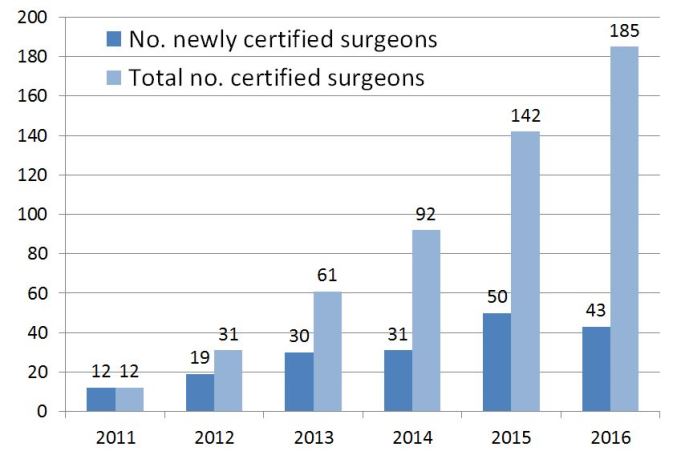Hepato-biliary-pancreatic surgery is said to be a particularly difficult branch of gastrointestinal surgery. In order to foster the development of surgeons capable of performing safe and reliable high-level procedures, the Japanese Society of Hepato-Biliary-Pancreatic Surgery initiated a board-certification system for expert surgeons in 2008.
To become the board-certified expert, surgeons are first required to be certified as a board certified surgeon in Gastroenterology *1; to have completed at least 3 years of training at a board certified training institution (Hepatobiliary-Pancreatic field) *2; to have performed a prescribed number*5 of operations under the guidance of a board-certified instructor*3 to build up experience in high-level hepato-biliary-pancreatic surgery*4; and to have attended annual meetings and educational seminars. Applicants also need to submit supporting documentation, including surgical records, for assessment of whether advanced surgeries were performed correctly. Applicants must also submit un-edited videos of advanced hepato-biliary-pancreatic surgeries performed themselves for assessment of whether the surgery was conducted in a safe and appropriately independent manner. Only applicants who have passed both these assessments can become board-certified expert surgeons.
(*1)Certification as a board certified surgeon in Gastroenterology
To become a board certified surgeon in Gastroenterology, the applicant must first become a board Certified Surgeon. To certify as a board Certified Surgeon, the applicant must train for at least 5 years at a certified institution and have experience of performing general surgery in 350 cases (acting as the chief surgeon in at least 120 surgeries). The applicant also has to pass written and oral examinations before they are certified as a board Certified Surgeon. To then become certified as a board certified surgeon in Gastroenterology, the applicant needs to complete at least 5 years of clinical training (at least 9 years after graduating) in a board-certified training institution, during which time they will operate on 450 cases of gastrointestinal surgery (acting as the chief surgeon in at least 100 surgeries), and to present at least six research papers on gastroenterological surgery (including three published papers) and attend annual meetings and educational seminars. Only then can an application for certification be submitted. Applicants then need to pass a written examination in order to be certified as a board certified surgeon in Gastroenterology.
(*2)What is a board certified training institution (Hepatobiliary-Pancreatic field)?
It is an institution accredited as a board-certified training institution by the Japanese Society of Gastroenterological Surgery that has at least one full-time board-certified instructor or board-certified expert surgeon on staff and that performs more than 50 cases of highly advanced surgery for Hepatobiliary and Pancreatic field in a calendar year (Training Institution A) or more than 30 such surgeries in a calendar year (Training Institution B). As of December 2016, there were 111 Training Institution A facilities and 106 Training Institution B facilities nationwide.
(*3) What is a board-certified instructor (Hepatobiliary-Pancreatic field)?
An instructor who is board-certified as a gastroenterological expert surgeon or instructor, is engaged in a teaching role for hepato-biliary-pancreatic surgical cases, and has experience of at least 100 high-level hepato-biliary-pancreatic surgeries (including as a teaching assistant). As of December 2016, there were 640 board-certified instructors.
(*4) What is high-level hepato-biliary-pancreatic surgery?
High-level hepato-biliary-pancreatic surgery describes specific surgical procedures as defined by the Japanese Society of Hepato-Biliary-Pancreatic Surgery and does not include relatively simple hepato-biliary-pancreatic surgeries (such as partial hepatectomy, hepatic lateral segmentectomy, or distal pancreatectomy for benign conditions).
(*5) Number of surgeries required for application for a board-certified expert surgeon (Hepatobiliary-Pancreatic field)?
The applicant must have performed at least 50 cases of highly advanced surgery for Hepatobiliary and Pancreatic field as the chief surgeon under the guidance of board-certified instructors or board-certified expert surgeons at a board-certified training institution. As well as this experience as the chief surgeon in 50 cases, the applicant must also have experience of acting as the first assistant in at least five cases each of highly advanced surgery for Hepatobiliary field and highly advanced surgery for pancreatic surgery.
Trends in the number of board-certified expert surgeons





